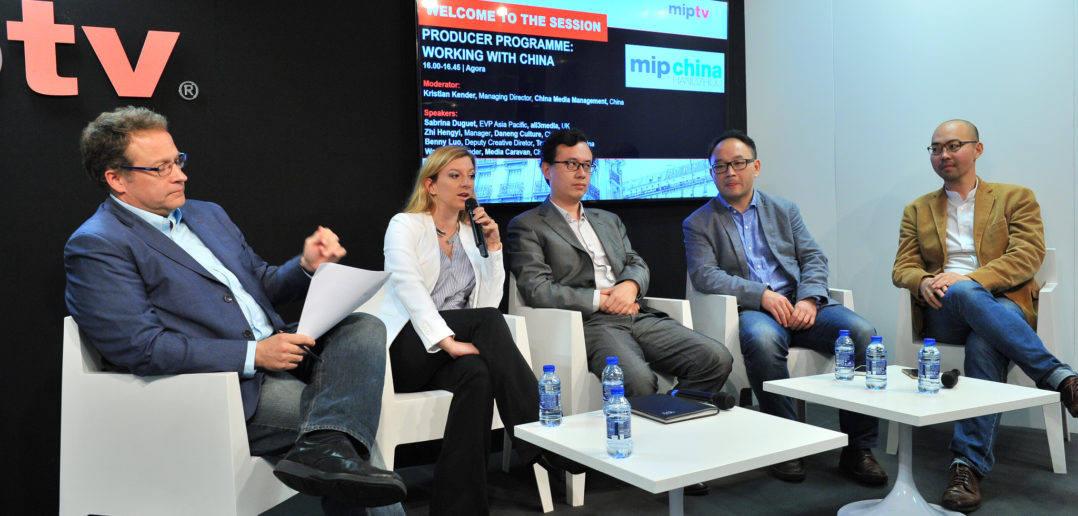China’s potential as a creative powerhouse is well known, but how can TV companies there develop even better partnerships and do better business with companies in the west?
That was the topic for discussion at a panel session at MIPTV today, in advance of May’s MIP China Hangzhou International Content Summit, which will focus on bringing together content producers from China and around the world, to foster more cooperation.
The panel included Sabrina Duquet, EVP Asia Pacific at all3media; Zhi Hengyi, manager at Daneng Culture in China; Benny Luo, deputy creative director at Tencent Video; and Wang Yi, founder of Media Caravan. The moderator was Kristian Kender, MD of CMMI.
« There’s more and more interest in developing production projects with China, » said Kender, as he introduced the session, and asked the panelists to talk about some aspects of China that can surprise western production companies.
« The biggest mistake you can make when you work with Chinese partners is to ignore the challenges. There are challenges, but it’s important to address them and work together, » said Duguet. « We can all learn from each other. »
Hengyi said he’s been surprised to discover that docudrama and current affairs have become the hottest topic for online viewing in China, while Luo said the biggest surprise he sees for overseas producers is that in China « making reality shows or factual entertainment might be a risky business… whenever the deal is made, you have to be careful ». For example, if a show doesn’t reach a certain rating, the producer may only get 60% or 70% of the agreed fee. « You may lose money! »
Yi talked about the production costs for domestic non-scripted productions, which are actually higher than for the scripted shows – a big contrast to the west. « Also how much we rely on the celebrities in China. If you’re doing a show about the common people in China, you will not find advertisers, or even probably a platform, » he said. Yi also noted that every co-production project is different, with its own business model.
Duquet said choosing the right partner for the right project is essential. « Yes, co-production is definitely something that is on the table, but choosing the right partner for the project is definitely very key, » she said. Hengyi talked about how this works in documentaries. « We can approach the subject from different angles. That’s the thing that really inspires the Chinese audiences, » he said. « When you come into China, you’ve got to have something that we understand and we are familiar with. But we also want to learn. »
He added that a production company cannot come to China with a project that has no financial support already in place and expect to find potential partners falling over themselves to work with it. Luo talked about how deal structures are changing, noting that more than 50% of Tencent’s format ideas were developed in-house by its team. « We know what our viewers want. And we need to share our knowledge with the Chinese indies, who have a relationship with us.
Wang Yi talked about Media Caravan’s latest deal to make a project based on Sherlock Holmes: the missing years after he is pushed over a waterfall by his arch-nemesis Moriarty. « Sometimes you want to be a part of greater things, » he said. « China will be an organic co-producer in it. Not just injecting money: we can also contribute creativity to the project. »
Duquet said that co-production deals can give Chinese producers easier access to overseas markets: for example, when a French broadcaster, a British broadcaster and a Chinese producer team up – something that has become easier under recent regulatory changes in China.
Hengyi criticised projects that portray China as a backward or poverty-stricken nation, which he says remain all-too-common. « Chinese producers and platforms would like to see from a different angle, a different aspect, looking at the modern development of China. That’s what we’re proud of!.. That’s the stuff we want to get international producers involved in. To portray China in a decent way, not only in a poor way. »
Luo talked about a recent hit on Tencent – a comedy roast where a celebrity is roistered by their famous friends. He admitted that he hadn’t been sure if it would work. « In China it’s very uncommon for me to criticise you while facing you! » he said. But it’s been a success, especially with Tencent’s younger viewers. « The Chinese young audience are moving very fast, keeping up with the outside world. »
Wang Yi continued. « If you’re a co-producer, if you want to work with China, and you come to China with a well-established plan. Well, get ready to be disappointed! The market changes every day, so always upgrade your plan and your agenda, » he said. « Get to know the market, get to understand the people, and then you will have better management of your project. »
And one more piece of advice: « Never take a ‘yes’ as ‘yes’ in China until you actually see the signature on the contract, » he said. « Often we will say ‘yes’ as in ‘we understand’, not ‘yes’ as in ‘let’s do it’… »
The conversation turned to the political situation in China, where the agendas of the terrestrial broadcasters can vary according to the directives coming from the governments: themes can suddenly fall out of fashion, or become hot. Producers must be flexible to adapt, then, and prepared for the occasional disappointment.
Copyright also cropped up as a topic. « We’ve had lovely people getting inspired by a lot of our shows! » said Duquet, choosing her words carefully. « The format business is a gentleman’s business: it’s very hard legally, actually, to protect a format… So based on that, yes, it’s probably even harder in China. » But she suggested that forming strong partnerships in China is a way to mitigate that risk.




